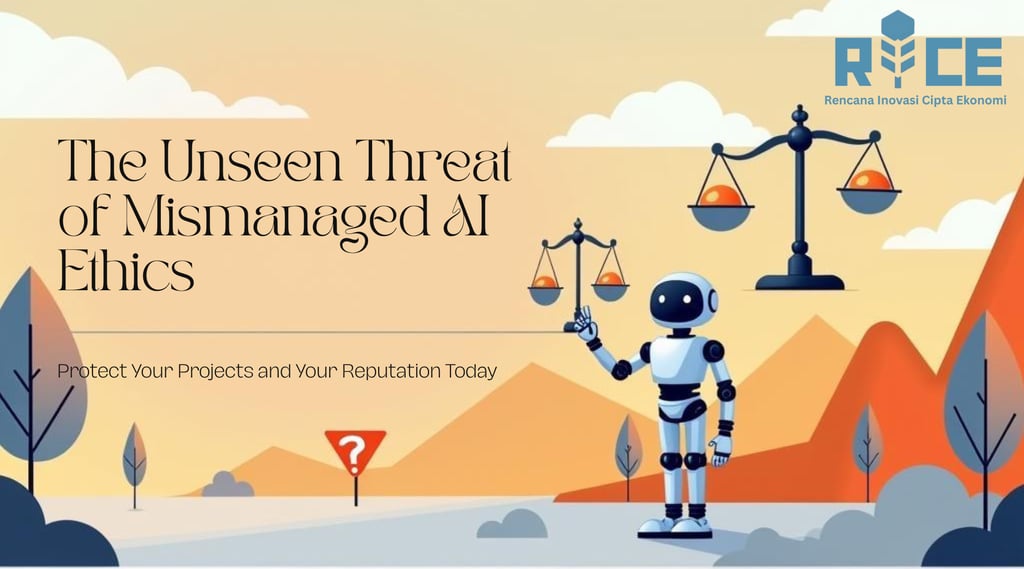The Unseen Threat: How Mismanaged AI Ethics Can Derail Your Project and Reputation
Learn to avoid common pitfalls like bias, opacity, and privacy breaches with proactive solutions
TECHNOLOGY
Rice AI (Ratna)
9/12/20257 min read


The promise of Artificial Intelligence (AI) to revolutionize industries, streamline operations, and unlock unprecedented efficiencies has captivated professionals across every sector. From enhancing customer service with intelligent chatbots to optimizing supply chains with predictive analytics, AI's transformative power is undeniable. However, amidst the fervent adoption and rapid innovation, a critical, yet often underestimated, challenge lurks: the ethical implications of AI development and deployment. Neglecting these ethical considerations isn't merely a moral oversight; it's a strategic misstep with the potential to inflict severe damage on projects, undermine trust, and irrevocably tarnish an organization's reputation.
This article delves into the common mistakes organizations make in managing AI ethics and offers practical, problem-solution approaches to navigate this complex landscape. For industry experts and professionals steering the AI revolution, understanding these unseen threats is paramount to building resilient, responsible, and reputable AI solutions. The choice before us is clear: embrace proactive ethical governance, or risk a future where innovative AI projects are derailed by avoidable controversies and public distrust.
The Illusion of Neutrality: Addressing Bias in AI Systems
One of the most insidious threats to AI projects stems from the deeply ingrained biases that can inadvertently permeate algorithms. AI systems learn from data, and if that data reflects existing societal inequalities, stereotypes, or historical prejudices, the AI will perpetuate and even amplify those biases. This isn't a theoretical concern; it's a documented reality, leading to real-world harm. For instance, facial recognition technologies have shown higher error rates for women and people of color, a critical flaw documented by researchers like Buolamwini and Gebru (2018). Similarly, algorithms used in hiring, loan applications, or even criminal justice have been found to discriminate against certain demographic groups, leading to unfair outcomes and legal challenges.
The mistake here is the assumption that algorithms are inherently objective. In truth, they are products of human decisions—from data collection and labeling to model design and evaluation—all of which can introduce or reflect bias. The impact extends beyond ethics; biased AI can lead to significant financial losses from lawsuits, regulatory fines, negative publicity, and a profound erosion of public trust.
The solution demands a multi-faceted approach. First, organizations must commit to diverse data sourcing and rigorous data auditing. This involves intentionally seeking out data that represents the full spectrum of the user base and scrutinizing datasets for historical or systemic biases before training. Second, implementing explainable AI (XAI) techniques can help identify why an AI makes a particular decision, allowing developers to trace and mitigate bias. Tools like "Model Cards" proposed by Mitchell et al. (2019) can standardize reporting on model performance and potential biases. Finally, human-in-the-loop oversight is crucial, providing a mechanism for human review and override in high-stakes decisions where algorithmic bias could lead to significant harm. At Rice AI, our comprehensive AI governance frameworks are designed to integrate robust bias detection and mitigation strategies, ensuring our clients’ AI systems are built on a foundation of fairness and equity.
Transparency and Explainability: Navigating the Black Box Dilemma
As AI models become increasingly sophisticated, their decision-making processes often become opaque, earning them the moniker "black boxes." While complex neural networks can achieve remarkable accuracy, understanding how they arrive at a specific conclusion can be incredibly challenging. This lack of transparency, or explainability, presents a significant ethical hurdle and a practical risk. When an AI system makes a critical decision—be it approving a medical treatment, denying a credit application, or flagging a security threat—stakeholders, regulators, and affected individuals often demand an explanation. Without it, trust diminishes, accountability becomes elusive, and debugging errors turns into a formidable task.
The common mistake is prioritizing performance metrics (like accuracy) above all else, often at the expense of understanding. While complex models might offer superior predictive power, their inherent opaqueness can lead to non-compliance with emerging regulations such as the GDPR's "right to explanation," and can undermine user adoption if people don't trust the AI's recommendations. Adadi and Berrada (2018) highlight the critical need for solutions that make AI decisions interpretable to humans.
To counter the black box dilemma, organizations must prioritize explainable AI (XAI) from the initial design phase, not as an afterthought. This involves selecting models and architectures that inherently offer some level of interpretability, or employing post-hoc explanation techniques that simplify the complex decisions of opaque models into human-understandable terms. Clear documentation of model architectures, training data, and decision rules is also vital. Furthermore, communication strategies must be developed to articulate AI outputs in a clear, concise, and understandable manner to non-technical audiences. At Rice AI, we believe powerful AI should also be transparent. Our solutions are engineered to provide interpretable insights, fostering confidence among users and ensuring compliance with evolving regulatory demands for clarity and accountability.
Data Privacy and Security: The Ethical Minefield of Information
AI systems thrive on data, making the ethical handling of personal and sensitive information a paramount concern. The aggregation, processing, and analysis of vast datasets by AI models present significant risks related to data privacy and security. Mismanagement in this domain can lead to severe consequences, from massive data breaches to the unauthorized use of personal information, ultimately eroding user trust and incurring hefty penalties. The Cambridge Analytica scandal, while not solely an AI issue, starkly illustrated the profound reputational and legal damage that can arise from the misuse of personal data on a large scale.
A critical mistake is viewing data privacy as a mere compliance checkbox rather than a fundamental ethical imperative. Organizations often collect more data than necessary, retain it for too long, or fail to implement adequate security measures, all of which amplify risk. The impact of such oversights includes massive regulatory fines (e.g., under GDPR or CCPA), legal liabilities from affected individuals, irreparable damage to brand reputation, and a significant loss of customer loyalty. Sutter (2020) emphasizes the need for Privacy Enhancing Technologies (PETs) in machine learning to mitigate these risks.
The solution requires a proactive and systemic commitment to privacy-by-design principles. This means integrating data protection safeguards into the core architecture of AI systems and processes from the very outset. Key strategies include data minimization (collecting only the necessary data), anonymization and pseudonymization techniques to protect individual identities, robust encryption for data at rest and in transit, and stringent access controls to limit who can access sensitive data. Organizations must also establish clear, ethical data acquisition policies, ensuring informed consent is obtained and honored. Regular security audits and vulnerability assessments are essential to identify and address potential weaknesses before they can be exploited. Rice AI is deeply committed to ethical data governance; our development protocols rigorously adhere to the highest standards of privacy protection, embedding privacy-enhancing technologies and best practices into every AI solution we deliver.
Accountability and Responsibility: Who is at the Helm?
As AI systems gain increasing autonomy and influence over critical decisions, the question of accountability becomes profoundly complex and ethically challenging. When an AI system makes an error that causes harm—whether in medical diagnostics, autonomous driving, or financial trading—who is ultimately responsible? Is it the data scientist, the project manager, the deploying organization, or the AI itself? The absence of clear lines of accountability can lead to ethical dilemmas, a reluctance to fully adopt beneficial AI technologies due to perceived risks, and a profound lack of redress for those negatively affected.
The common mistake is failing to establish clear governance structures and responsibility frameworks before deploying AI in high-stakes environments. Many organizations rush into AI adoption without adequately addressing the "who is responsible when things go wrong" question, assuming that the technical team or legal department will sort it out post-facto. This reactive approach leaves organizations vulnerable to public backlash, legal challenges, and a crisis of confidence. Jobin et al. (2019) highlight the global proliferation of AI ethics guidelines, underscoring the universal concern for accountability.
Addressing this requires a proactive approach to ethical governance and clear responsibility assignment. Organizations must develop and implement comprehensive AI ethics policies that define roles, responsibilities, and decision-making processes for every stage of an AI project lifecycle. This includes establishing human oversight mechanisms that can intervene, audit, and override AI decisions. Robust testing, validation, and monitoring protocols are essential to ensure the AI operates within defined parameters and to identify any deviations or unintended consequences. Furthermore, creating transparent mechanisms for redress and appeals allows individuals to challenge AI decisions and seek remedies for harm. These frameworks should align with established principles, such as the Asilomar AI Principles (Future of Life Institute, 2017), which advocate for AI control and responsibility. At Rice AI, we partner with organizations to develop and implement comprehensive AI governance strategies, ensuring that accountability is embedded at every stage of the AI lifecycle, fostering responsible innovation and ethical stewardship.
The Imperative of Ethical AI: Building Trust and Sustaining Innovation
The journey toward widespread AI adoption is fraught with ethical complexities, but these challenges are not insurmountable. The "unseen threats" of mismanaged AI ethics—ranging from algorithmic bias and the black box dilemma to data privacy breaches and ambiguous accountability—are not mere theoretical concerns. They are concrete risks that can derail projects, incur significant financial and legal penalties, and irreparably damage an organization's hard-won reputation.
For industry experts and professionals, understanding and proactively addressing these ethical dimensions is no longer optional; it is an imperative for sustainable innovation. Organizations that neglect AI ethics risk being left behind, losing out on public trust, competitive advantage, and ultimately, the full potential of their AI investments. Conversely, those that prioritize ethical considerations will build more robust, resilient, and reputable AI solutions. They will foster greater public acceptance, enhance regulatory compliance, and cultivate a stronger brand image as responsible technological leaders.
The future of AI is not just about building smarter machines; it’s about building smarter, more ethical systems that serve humanity equitably and responsibly. Embracing ethical AI means integrating fairness, transparency, privacy, and accountability into the very fabric of AI design, development, and deployment. This proactive stance transforms potential pitfalls into opportunities for deeper trust and broader societal benefit. By partnering with experts like Rice AI, organizations can confidently navigate the complex ethical landscape of AI, ensuring their projects not only succeed technologically but also stand as exemplars of responsible innovation. The choice to prioritize AI ethics today is an investment in a trusted, sustainable, and prosperous AI-driven future for all.
References
Adadi, A., & Berrada, M. (2018). Peeking Inside the Black-Box: A Survey on Explainable Artificial Intelligence (XAI). IEEE Access, 6 , 52138-52160. https://ieeexplore.ieee.org/document/8440051
Buolamwini, J., & Gebru, T. (2018). Gender Shades: Intersectional Phenotypic Demographics. Proceedings of the 1st Conference on Fairness, Accountability, and Transparency . https://www.media.mit.edu/publications/gender-shades-intersectional-phenotypic-demographics/
European Parliament. (2016). Regulation (EU) 2016/679 on the protection of natural persons with regard to the processing of personal data and on the free movement of such data, and repealing Directive 95/46/EC (General Data Protection Regulation) . Official Journal of the European Union, L 119, 1-88. https://eur-lex.europa.eu/eli/reg/2016/679/oj
Future of Life Institute. (2017). Asilomar AI Principles . https://futureoflife.org/2017/08/11/ai-principles/
Jobin, A., Ienca, M., & Vayena, E. (2019). The global landscape of AI ethics guidelines. Nature Machine Intelligence, 1 (9), 389-399. https://www.nature.com/articles/s42256-019-0088-2
Mitchell, M., Wu, S., Tenenbaum, J., Stoyanovich, J., D'Amour, A., & Gebru, T. (2019). Model Cards for Model Reporting. Proceedings of the Conference on Fairness, Accountability, and Transparency . https://arxiv.org/pdf/1810.05739.pdf
Sutter, A. (2020). Privacy Enhancing Technologies for Machine Learning. Communications of the ACM, 63 (2), 64-73. https://cacm.acm.org/magazines/2020/2/242279-privacy-enhancing-technologies-for-machine-learning/fulltext
#AIEthics #ResponsibleAI #AIGovernance #TechEthics #DataPrivacy #AIbias #FutureofAI #Innovation #RiskManagement #AIStrategy #DailyAITechnology
RICE AI Consultant
To be the most trusted partner in digital transformation and AI innovation, helping organizations grow sustainably and create a better future.
Connect with us
Email: consultant@riceai.net
+62 822-2154-2090 (Marketing)
© 2025. All rights reserved.


+62 851-1748-1134 (Office)
IG: @riceai.consultant
